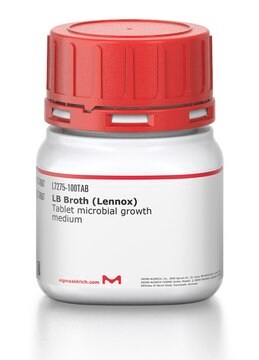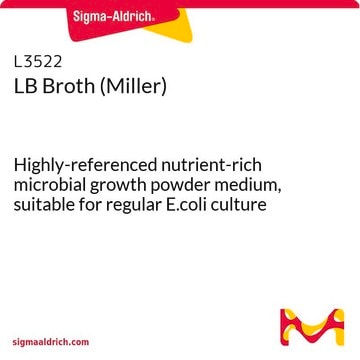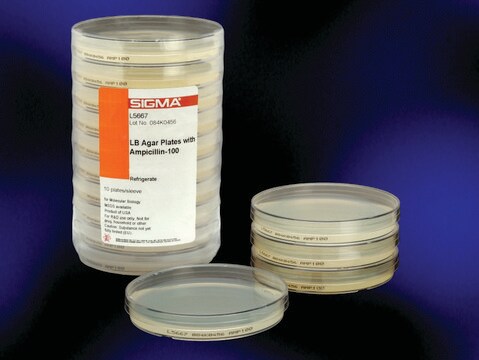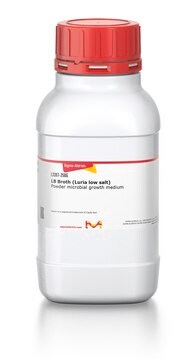L7025
LB Broth with agar (Lennox)
Tablet microbial growth medium
Synonym(s):
LB Agar, LB agar
Sign Into View Organizational & Contract Pricing
All Photos(2)
About This Item
UNSPSC Code:
12352200
NACRES:
NA.85
Recommended Products
grade
for molecular biology
Quality Level
sterility
non-sterile
form
tablet
technique(s)
microbiological culture: suitable
application(s)
food and beverages
microbiology
storage temp.
room temp
suitability
nonselective for Escherichia coli
nonselective for coliforms
General description
Lennox LB is a highly-referenced microbial growth medium used for the cultivation of E. coli. This nutrient-rich microbial broth contains peptides, amino acids, water-soluble vitamins, and carbohydrates in a low-salt formulation. The addition of agar provides a solid medium for microbial growth.
Application
Suitable for non-selective cultivation of E. coli strains for cloning, DNA plasmid production and production of recombinant proteins. Also suitable for selective cultivation when appropriate antibiotics are added, including those that require low-salt conditions, such as Zeocin®.
Features and Benefits
Lennox LB tablet with agar provides:
- A budget-friendly alternative to pre-poured plates
- Convenient small package to eliminate weighing
- Fast preparation – no stirring required
Components
13.72g/L Agar
9.14g/L Tryptone
4.57 g/L Yeast Extract
4.57 g/L NaCl
1.6g/L inert binding agents
9.14g/L Tryptone
4.57 g/L Yeast Extract
4.57 g/L NaCl
1.6g/L inert binding agents
Reconstitution
Add each 1.68 g tablet to 48.3 mL water (no stirring required). Autoclave for 20 minutes at 121 °C to sterilize. Allow to cool slightly before making additions, such as antibiotics (if desired). Pour into petri dishes and allow to solidify.
Legal Information
Zeocin is a registered trademark of Cayla Sarl
related product
Product No.
Description
Pricing
Storage Class Code
11 - Combustible Solids
WGK
WGK 2
Flash Point(F)
Not applicable
Flash Point(C)
Not applicable
Choose from one of the most recent versions:
Already Own This Product?
Find documentation for the products that you have recently purchased in the Document Library.
Customers Also Viewed
Atlas, R. M., L.C. Parks
Handbook of Microbiological Media (1993)
Shun Gen Huang et al.
BMC immunology, 14, 27-27 (2013-06-22)
Surgical intervention-related trauma contributes largely to the development of postoperative immunosuppression, with reduced resistance to secondary bacterial infection. This study compared the impact of laparotomy versus laparoscopy on macrophage-associated bactericidal ability and examined whether laparotomy renders the host more susceptible
Our team of scientists has experience in all areas of research including Life Science, Material Science, Chemical Synthesis, Chromatography, Analytical and many others.
Contact Technical Service












